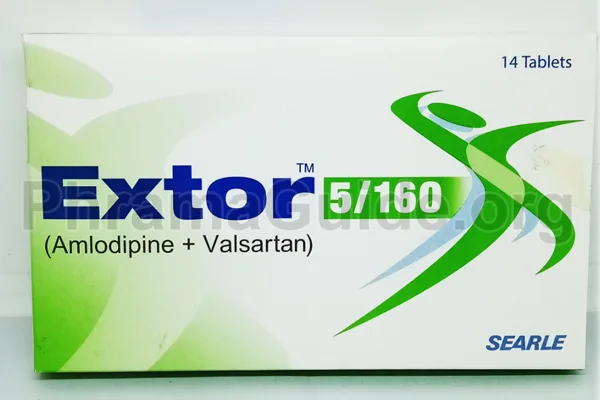Extor is an anti-hypertensive medication, that helps lower blood pressure by affecting different aspects of cardiovascular function. Like any medication, Extor can have side effects. Here are common and less common side effects associated with Extor.
Common Side Effects
- Edema (Swelling): Extor can lead to fluid retention in the body, causing peripheral edema, particularly in the ankles and feet.
- Headache: Headache is a common side effect of Extor.
- Dizziness: Some people may experience dizziness or lightheadedness when standing up, especially when they start taking the medication.
- Flushing: Extor can sometimes cause a sensation of warmth or flushing, especially in the face.
- Fatigue: Feeling tired or fatigued is another common side effect.
Less Common Side Effects
- Low Blood Pressure (Hypotension): Excessive blood pressure lowering can occur, leading to symptoms like severe dizziness, fainting, or blurred vision. This is more likely to occur if the dosage is too high or if there is a significant drop in blood pressure upon starting the medication.
- Irregular Heartbeat (Arrhythmia): Although rare, some individuals may experience irregular heartbeats while taking this medication.
- Hyperkalemia: Extor can sometimes cause elevated potassium levels in the blood, which, when severe, can lead to abnormal heart rhythms. Monitoring potassium levels is essential.
- Liver Function Abnormalities: Rarely, some individuals may experience changes in liver function, which may manifest as yellowing of the skin or eyes (jaundice), dark urine, or abdominal pain.
- Kidney Function Abnormalities: It is rare but a serious side effect, Extor can affect kidney function. Changes in kidney function can be monitored through regular blood tests.
- Allergic Reactions: Although uncommon, severe allergic reactions, with symptoms like rash, itching, swelling, severe dizziness, and difficulty breathing, may occur.
- Muscle Pain (Myalgia): Some individuals may experience muscle pain or weakness.
- Nausea and Stomach Upset: Gastrointestinal symptoms like nausea or stomach discomfort are less common but can occur.

What is Extor?
Extor is one of the leading brands of Amlodipine and Valsartan, manufactured and marketed by Searle Pharmaceuticals Pakistan.
Extor : Available Formulations and Strengths
Presently, Extor is available in Tablet Form
Extor Tablets : 5mg + 80mg (Amlodipine + Valsartan)
Extor Tablets : 10mg + 160mg (Amlodipine + Valsartan)
Extor Tablets : 5mg + 160mg (Amlodipine + Valsartan)
What Are The Possible Drug Interactions of Extor?
- Potassium Supplements and Potassium-Sparing Diuretics: Extor can cause an increase in potassium levels in the blood. Taking potassium supplements or using potassium-sparing diuretics (e.g., spironolactone) alongside this combination can lead to potentially dangerous levels of potassium in the blood (hyperkalemia).
- ACE Inhibitors: Combining Extor with ACE (angiotensin-converting enzyme) inhibitors, like enalapril or lisinopril, may increase the risk of hyperkalemia and low blood pressure. Your healthcare provider will carefully monitor your potassium levels in such cases.
- Aliskiren: Concomitant use of Extor with aliskiren (another antihypertensive medication) may increase the risk of kidney problems, low blood pressure, and high potassium levels.
- Lithium: Lithium is used to treat bipolar disorder. When taken with Extor, it may increase lithium levels in the blood, potentially leading to lithium toxicity. Frequent monitoring of lithium levels is necessary.
- Diuretics (Thiazides): Combining thiazide diuretics with Extor may lead to an increased risk of low blood pressure. However, some patients may benefit from this combination under close medical supervision.
- Nonsteroidal Anti-Inflammatory Drugs (NSAIDs): NSAIDs, such as ibuprofen or naproxen, can reduce the antihypertensive effects of Extor. It can also increase the risk of kidney problems.
- Grapefruit and Grapefruit Juice: Grapefruit and grapefruit juice can inhibit the metabolism of Extor, potentially increasing its levels in the bloodstream. This can lead to a higher risk of side effects. It’s generally advisable to avoid grapefruit products when taking Extor.
- CYP3A4 Inhibitors and Inducers: Extor is metabolized by the CYP3A4 enzyme. Medications that inhibit or induce this enzyme can affect the levels of Amlodipine in the blood, potentially influencing its effectiveness or side effects. Common CYP3A4 inhibitors include clarithromycin and grapefruit juice.

Leave A Comment